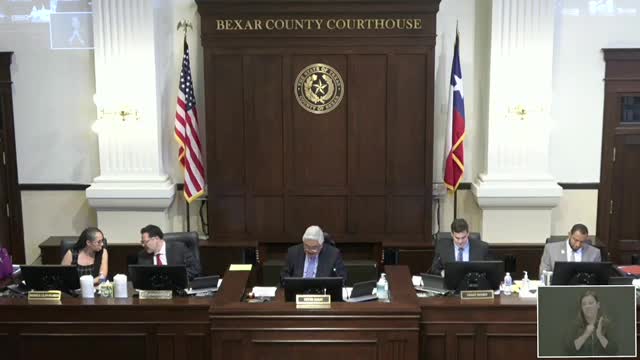Constable Adam updates Bexar County on eviction process changes and personnel needs
August 05, 2025 | Bexar County, Texas
This article was created by AI summarizing key points discussed. AI makes mistakes, so for full details and context, please refer to the video of the full meeting. Please report any errors so we can fix them. Report an error »

In the bustling chambers of Bexar County's Commissioners Court, a sense of urgency filled the air as officials gathered to address pressing community needs. The meeting, held on August 5, 2025, opened with a swift approval of the minutes from the previous session, setting the stage for a series of critical discussions.
One of the most significant moments came when Constable Adam took the floor, presenting a detailed account of the challenges faced by his office in light of new legislation and growing demands. He highlighted two key bills that will soon impact the eviction process: the squatter law (SB 1333), effective September 2025, and SB 38, which aims to expedite eviction proceedings starting in January. These changes, he noted, will reduce the time for processing evictions from ten days to just five, a shift that could significantly affect both landlords and tenants in the county.
Constable Adam also shared insights into the operational demands on his office, emphasizing the need for additional personnel to manage the increasing workload. With the population of Bexar County on the rise, he argued that the current staffing levels are insufficient to handle the volume of civil processes, particularly evictions. He explained that the complexity of these cases often requires multiple officers for safety reasons, especially when dealing with individuals who may have outstanding felony warrants.
The constable's request for more officers was framed not just as a matter of efficiency but as a crucial step toward ensuring public safety. He assured the court that the investment in additional personnel would be self-sustaining, as each officer would generate revenue through the processes they serve. This financial aspect, combined with the pressing need for safety during evictions, painted a compelling picture for the commissioners.
As the meeting progressed, the court listened attentively to the constable's concerns, recognizing the broader implications of the legislative changes and the growing demands on law enforcement. The discussions underscored a pivotal moment for Bexar County, where the intersection of law, community needs, and public safety continues to evolve.
With the meeting drawing to a close, the commissioners were left to ponder the implications of these developments. The decisions made in these chambers will not only shape the operational landscape of the constable's office but also impact the lives of countless residents navigating the complexities of housing and law enforcement in Bexar County.
One of the most significant moments came when Constable Adam took the floor, presenting a detailed account of the challenges faced by his office in light of new legislation and growing demands. He highlighted two key bills that will soon impact the eviction process: the squatter law (SB 1333), effective September 2025, and SB 38, which aims to expedite eviction proceedings starting in January. These changes, he noted, will reduce the time for processing evictions from ten days to just five, a shift that could significantly affect both landlords and tenants in the county.
Constable Adam also shared insights into the operational demands on his office, emphasizing the need for additional personnel to manage the increasing workload. With the population of Bexar County on the rise, he argued that the current staffing levels are insufficient to handle the volume of civil processes, particularly evictions. He explained that the complexity of these cases often requires multiple officers for safety reasons, especially when dealing with individuals who may have outstanding felony warrants.
The constable's request for more officers was framed not just as a matter of efficiency but as a crucial step toward ensuring public safety. He assured the court that the investment in additional personnel would be self-sustaining, as each officer would generate revenue through the processes they serve. This financial aspect, combined with the pressing need for safety during evictions, painted a compelling picture for the commissioners.
As the meeting progressed, the court listened attentively to the constable's concerns, recognizing the broader implications of the legislative changes and the growing demands on law enforcement. The discussions underscored a pivotal moment for Bexar County, where the intersection of law, community needs, and public safety continues to evolve.
With the meeting drawing to a close, the commissioners were left to ponder the implications of these developments. The decisions made in these chambers will not only shape the operational landscape of the constable's office but also impact the lives of countless residents navigating the complexities of housing and law enforcement in Bexar County.
View full meeting
This article is based on a recent meeting—watch the full video and explore the complete transcript for deeper insights into the discussion.
View full meeting
